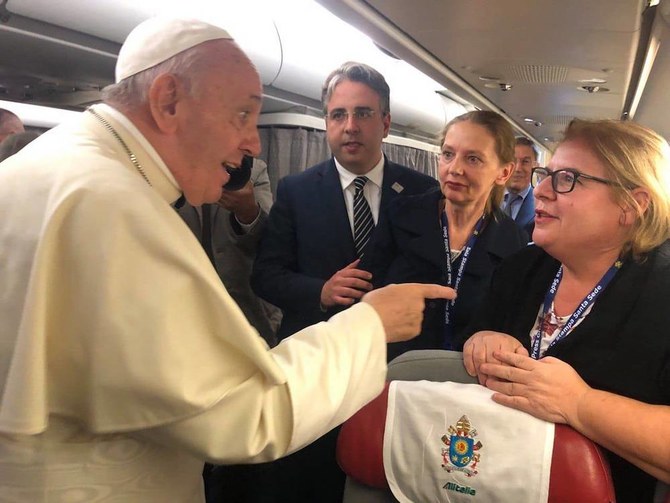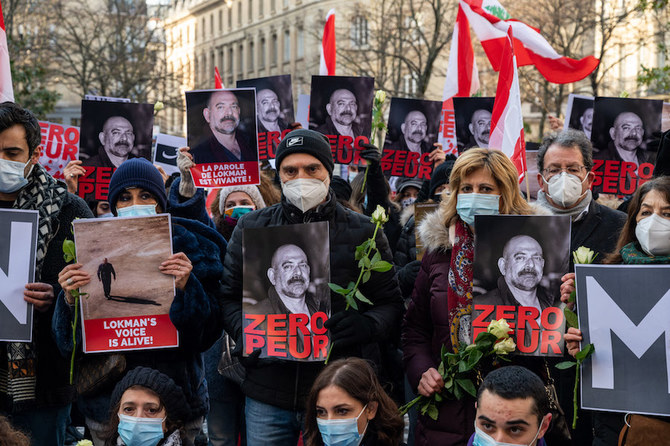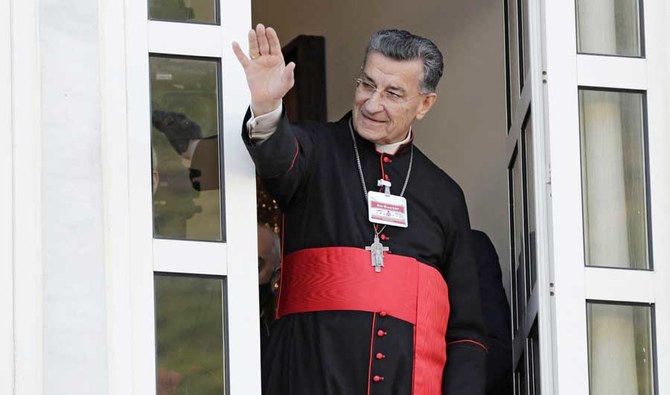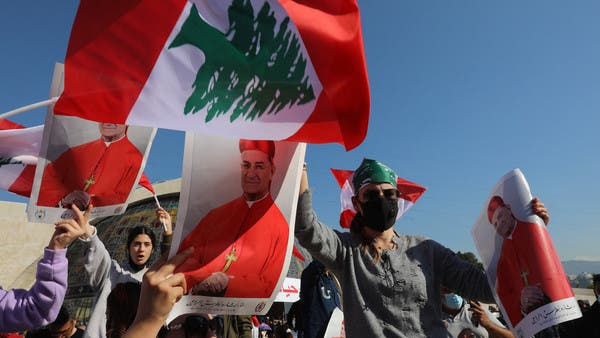
By FRANCESCO BONGARRÀ -- arabnews.com -- ROME: International media are following the pope’s visit to Iraq with enormous interest. Seventy-five journalists will travel aboard the special flight that will take the leader of the Catholic Church from Rome to Baghdad — almost double the number normally allowed on a papal flight. In addition, hundreds of reporters and camera crews will follow his visit on the ground. “This is certainly a historic journey. Francis is the first pope to go to Iraq, and he’ll be the first head of the Christian Church to enter the house of Abraham in Ur, where the history of Christianity began,” Manuela Tulli, Vatican correspondent for ANSA — Italy’s main news agency — told Arab News. She has been covering Pope Francis since he was elected in 2013. Though this will be her first visit to Iraq, it will be her sixth trip as an embedded reporter following him.
This journey “could change the history of interreligious dialogue,” and “may represent a historic turning point for Iraq,” she said. “The pope will go to that country in the middle of the second wave of the COVID-19 pandemic. Then, of course, there’s the problem of security in Iraq.” Pope Francis has expressed an interest in visiting the country and the Christians who live there since he was elected. “The pope wants to go. He wants to send a message of peace to a land tormented by war and divisions,” Tulli said. “He wants to go and say ‘basta’ (‘enough’) of war and violence. He isn’t afraid of the pandemic or any security issue.”

By Osama Habib -- dailystar.com.lb -- BEIRUT: Most Lebanese banks might be able to increase their capital by 20 percent on Feb. 28 and may partially be able to repatriate part of the 3 percent liquidity from abroad, but the challenges that lie ahead may be difficult to absorb in the future. All or most banks have apparently increased their capital by 20 percent, although many of them have not secured the 3 percent liquidity requirement, which could prompt the Central Bank to either put these lenders under its direct control or negotiate with them individually. Bankers interviewed by The Daily Star have warned that 2021 may be one of the biggest tests they will face as the lenders will be obliged to increase their capital adequacy ratio (Basel III requirement) by 8.5 percent before the end of 2021.
The Central Bank Thursday said that the Feb. 28 deadline for all banks to increase their capitals and repatriate 3 percent of the liquidity from correspondent banks will not be extended. “Contrary to what is circulated in many articles and analyses, Banque du Liban stresses that banks must comply with all the deadlines stipulated in its circulars to increase capital and secure external liquidity without any modification,” BDL said in a statement. BDL also stressed that after Feb. 28, 2021, banks must send all their data to the Banking Control Commission, which in turn checks them and sends the relevant reports to the Banque du Liban. “BDL also affirms that, according to the text of Article 70 of the Monetary and Credit Law, the stability of the banking sector is one of its duties and priorities, and therefore its approach will aim to take all measures aimed at addressing the situation of banks, leading to strengthening the stability of the banking situation and ensuring the funds and rights of depositors,” BDL added. Rami Nemer, the chairman of First National Bank, said his bank was able to increase the capital and secure at least 99 percent of the 3 percent liquidity requirement. “We already have over 9 percent of the capital adequacy ratio which is more than Basel III requirement. We did all these things to maintain our operations but I am still worried about the future if things in Lebanon continue to deteriorate like that,’ Nemer said. But many small and medium size banks were compelled to buy dollar banknotes from the black market in large volumes to secure part of the 3 percent requirement.


By TAREK ALI AHMAD -- arabnews.com -- LONDON: After US President Joe Biden’s administration took measures to sanction Saudi officials that took part in 2018 murder of Saudi journalist Jamal Khashoggi, several Middle East experts have accused the US of deploying double standards. White House Press Secretary Jen Psaki, as well as several US State Department officials, have repeatedly said that Washington will no longer tolerate the targeting of journalists and dissidents. The case of Jamal Khashoggi has been at the center of these statements. However, critics are asking why the US administration is not deploying the same standards to the killers of other journalists, and those involved with similar violence across the region. “We should ask ourselves what is the purpose behind the publication of the report? It is very obvious that the revival of the issue after two years aims at putting pressure on Saudi Arabia,” US-Arab affairs expert Dr. Dania Koleilat Khatib told Arab News. Another commentator, Hussain Abdul-Hussain, tweeted: “Now that we have finished from the Khashoggi affair, can the US give any attention to the assassination of Hisham Al-Hashemi and Lokman Slim? Or is there no lobby behind them to demand the disclosure of their killers?”
Indeed, while this month’s killing of Lebanese publisher and vocal Hezbollah critic Luqman Slim was condemned by US Secretary of State Antony Blinken, that was as far as it went — and his statement even shied away from naming the known culprits, Hezbollah. Another, Iraqi researcher, Hisham al-Hashimi, was shot dead outside his Baghdad home last year in a drive-by long-suspected to have been set up by Iran-backed Kata’ib Hezbollah. “We also should examine the timing. It is while the US is seeking to go back to the nuclear deal. This could be a tool to pressure Saudi Arabia to accept the decisions of the US regarding Iran, and to coerce the Kingdom into making concessions,” Khatib said, adding: “They don’t want to disturb the flow of communications with Iran.” She said: “Even though the US is committed to human rights, how adamant and forceful they are in taking a position is taken in a political context.”


khazen.org stands by Our Maronite His Beatitude Cardinal Patriarch Rai and offers all its support!
BEIRUT (Reuters) By Matilda Colman – Hundreds of Lebanese gathered at the seat of the Maronite church on Saturday to support calls by its leader for the country to be neutral in regional conflicts as a way to lead it out of political and economic crisis. Lebanon has been in financial meltdown since 2019 and feuding politicians have been unable to form a government since the last one quit in the aftermath of an Aug. 4 explosion in the capital, leaving the country rudderless. Maronite Patriarch Bechara Boutros Al-Rai has repeatedly urged political rivals to agree a new administration, and recently called for a U.N.-sponsored international conference to help break the deadlock. “You came from all over Lebanon … to support two things: neutrality and an international conference for Lebanon under the auspices of the United Nations. In one word you came here to save Lebanon,” Rai, who is Lebanon’s most senior Christian cleric, told the crowd at the church’s seat in Bkirki. “Through an international conference we want to announce the neutrality of Lebanon so that it does not return to become a victim of conflicts and wars and divisions,” he said. “There are no two states in one land and no two armies in one state.”
Rai did not specifically refer to the Iranian-backed Hezbollah, but several people in the crowd shouted “Iran, get out” in reference to the Shi’ite group. Heavily armed Hezbollah has supported Iran in its power struggle with Sunni-led Arab Gulf states in the region. Opponents of the group say its alliance with Tehran has led Gulf Arabs – who once supported Lebanon – to steer clear, closing off an important source of aid. Prime Minister-designate Saad al-Hariri was given the task of forming a government in October but is struggling to cobble together a cabinet to share power with all Lebanese parties, including Hezbollah. Hariri said earlier in February there was no way out of the crisis without the support of Arab countries.
Khazen History


Historical Feature:
Churches and Monasteries of the Khazen family

St. Anthony of Padua Church in Ballouneh
Mar Abda Church in Bakaatit Kanaan
Saint Michael Church in Bkaatouta
Saint Therese Church in Qolayaat
Saint Simeon Stylites (مار سمعان العامودي) Church In Ajaltoun
Virgin Mary Church (سيدة المعونات) in Sheilé
Assumption of Mary Church in Ballouneh
1 - The sword of the Maronite Prince
2 - LES KHAZEN CONSULS DE FRANCE
3 - LES MARONITES & LES KHAZEN
4 - LES MAAN & LES KHAZEN
5 - ORIGINE DE LA FAMILLE
Population Movements to Keserwan - The Khazens and The Maans
ما جاء عن الثورة في المقاطعة الكسروانية
ثورة أهالي كسروان على المشايخ الخوازنة وأسبابها
Origins of the "Prince of Maronite" Title
Growing diversity: the Khazin sheiks and the clergy in the first decades of the 18th century
Historical Members:
Barbar Beik El Khazen [English]
Patriach Toubia Kaiss El Khazen(Biography & Life Part1 Part2) (Arabic)
Patriach Youssef Dargham El Khazen (Cont'd)
Cheikh Bishara Jafal El Khazen
Patriarch Youssef Raji El Khazen
The Martyrs Cheikh Philippe & Cheikh Farid El Khazen
Cheikh Nawfal El Khazen (Consul De France)
Cheikh Hossun El Khazen (Consul De France)
Cheikh Abou-Nawfal El Khazen (Consul De France)
Cheikh Francis Abee Nader & his son Yousef
Cheikh Abou-Kanso El Khazen (Consul De France)
Cheikh Abou Nader El Khazen
Cheikh Chafic El Khazen
Cheikh Keserwan El Khazen
Cheikh Serhal El Khazen [English]
Cheikh Rafiq El Khazen [English]
Cheikh Hanna El Khazen
Cheikha Arzi El Khazen
Marie El Khazen